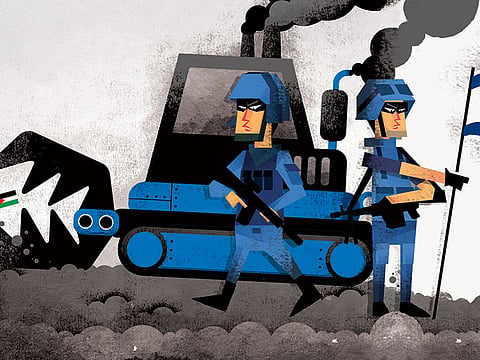West Bank fire began long ago
Netanyahu’s policies have engendered a casual sense of domination and impunity among the colonists

Last week’s horrific arson attack on a Palestinian home by suspected Israeli extremists, in which an 18-month-old Palestinian toddler was burnt to death [his father succumbed to his injuries yesterday] was, as Israeli Prime Minister Benjamin Netanyahu declared, “a terrorist crime.” What he did not say was that the attack on the Dawabshe family home, in the West Bank village of Duma, fits into a larger pattern of colonist violence and domination over Palestinian civilians that undermines any chance for peace in the Israeli-Palestinian conflict.
The fire in Duma cannot be seen as a random event. Rather, it is the outcome of decades of Israel’s expansionist policies in the West Bank. Since the signing of the Oslo peace accords in 1993, the number of colonists has more than tripled, to 350,000, not including occupied East Jerusalem — growth the so-called peace process failed completely to curtail.
The transformation of the West Bank includes military posts, surveillance towers and buffer zones to enforce Israel’s colonisation. Israel’s military directly controls more than 60 per cent of the West Bank. In April, the Israeli human rights organisation B’Tselem reported hundreds of fixed and “flying” checkpoints and other obstacles — in a land smaller than Delaware — that limited or discouraged Palestinian travel in the West Bank. Colonists face few such restrictions. The colonists, drawn to “Judea and Samaria” by religious fervour or enticed by Israeli subsidies, are emboldened by the army that protects them.
In Hebron, where about 1,500 soldiers protect some 800 Jewish colonists, Israelis and Palestinians are segregated. Palestinians have been barred from the once-bustling Shuhada Street, now nearly vacant, and the “separation principle,” B’Tselem declared, “led to the economic collapse of the centre of Hebron.”
Systematic demolitions
In the Jordan Valley, and throughout most of the occupied West Bank, residents are barred from making improvements on their homes; unapproved structures are systematically demolished by the army. Jordan Valley colonists use an estimated 18 times more water than local Palestinians, who watch their farms wither.
According to Human Rights Watch, Palestinian children, some as young as 11, pick vegetables in the Jordan Valley’s Jewish colonies, many for less than half of Israel’s legal minimum wage, to help support their families. The dominion colonists claim over the West Bank only becomes darker and more violent as their numbers sharply increase and Israel’s occupation grows more entrenched. Extremist colonists have attacked Palestinians during the annual olive harvest, burning their orchards and even some village mosques. In the South Hebron Hills, Palestinian schoolchildren have been stoned by colonists.
In June, the Dutch government issued a travel advisory for the West Bank, warning of security risks because of the violence of “Jewish colonists.” Israel called the advisory slanderous.
Netanyahu and other Israeli officials promise to bring the perpetrators of the Duma killing to justice. That would be the exception. Yesh Din, another Israeli human rights organisation, monitored police activity from 2005 to 2014 and found that just 7.4 per cent of Israeli investigations of Palestinian complaints about such colonists attacks resulted in indictments. By contrast, the conviction rate for Palestinians charged with crimes of all kinds is 99.7 per cent.
“We are shocked,” Netanyahu declared of the Duma attack. But really, he shouldn’t be surprised. He has championed the building of Jewish colonists, the network of exclusive roads for colonists only and the fragmentation of Palestinian land in the name of security and protection of the colonists. It all adds up to a casual sense of domination and impunity among the colonists.
Perhaps because of the extreme cruelty of the Duma case, this incident will end differently. But one case can’t erase the reality of two separate and unequal peoples on one land — one free, the other under indefinite and punishing confinement. The challenge now is to recognise Duma as the terrible by-product of a Jim Crow-like system of occupation. And to finally dismantle that system for good.
— Los Angeles Times
Sandy Tolan is an associate professor at the Annenberg School for Communication and Journalism at USC. His latest book is Children of the Stone: The Power of Music in a Hard Land, about the building of a music school in the occupied West Bank.


